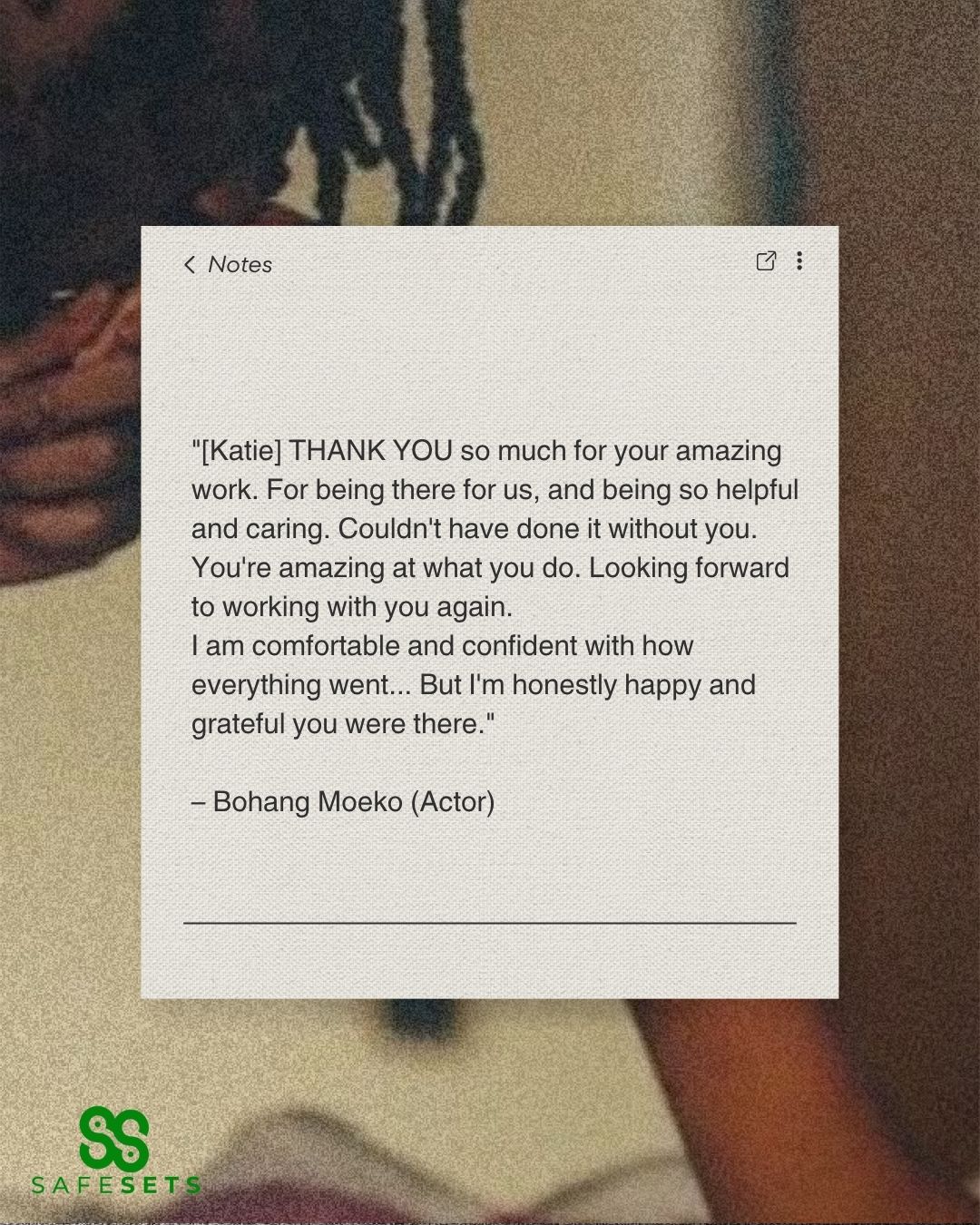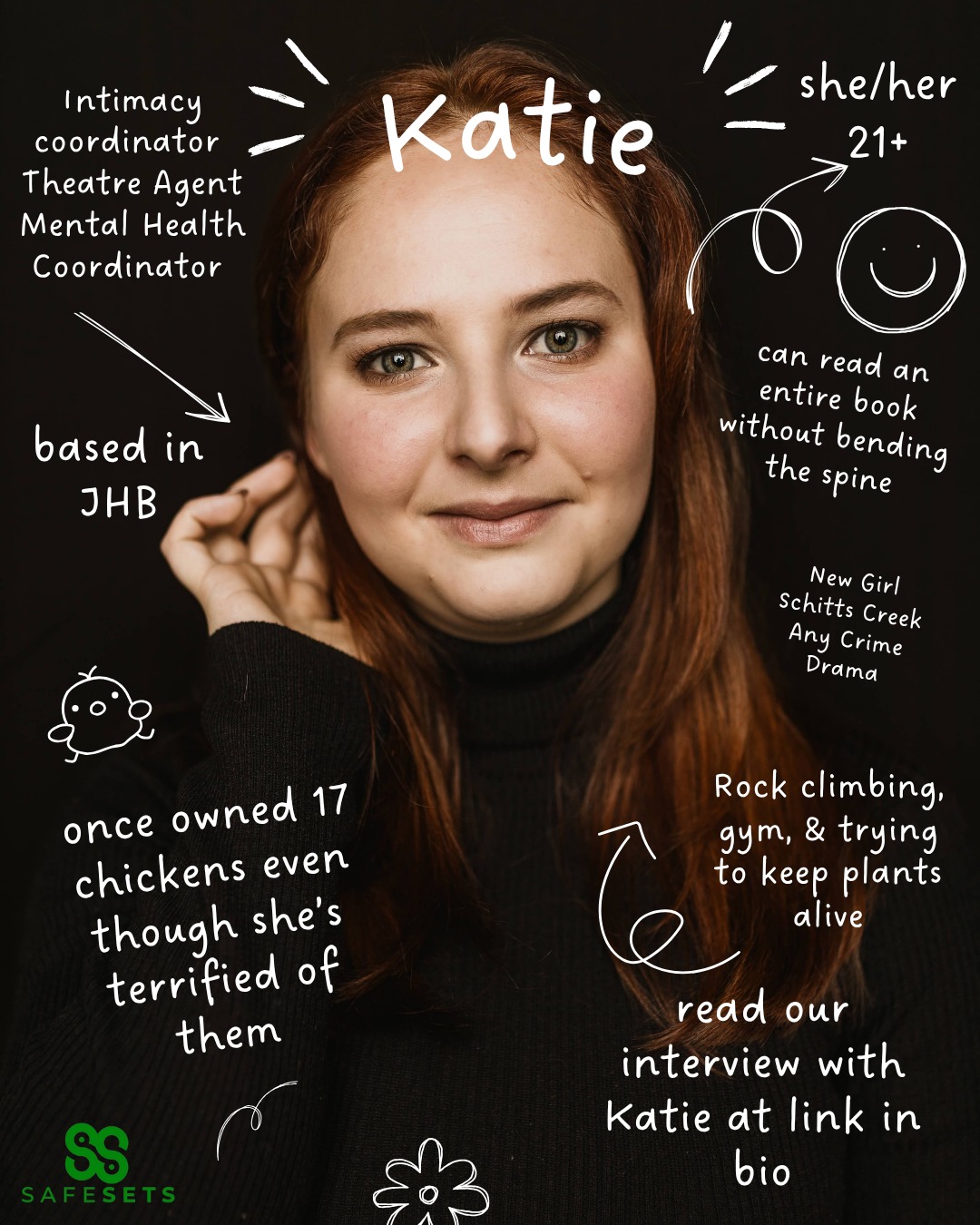You Don't Have to Suffer for the Role!
Katie Groves on Safe Character Work and Mental Health in Performance
Intimacy coordinator and newly trained mental health coordinator Katie Groves talks about why personal trauma shouldn't be a prerequisite for emotional truth, the small sensory tools that keep actors grounded, and how connection—not isolation—is the secret to great performances.
In Conversation: Katie Groves on Safe Character Work and Mental Health in Performance
Katie Groves works at the intersection of artistry and care. As an intimacy coordinator and newly trained mental health coordinator with Safe Sets, she helps actors navigate the emotional demands of performance without sacrificing their wellbeing. Her approach blends somatic awareness, clinical grounding techniques, and a deep respect for the actor's process—whether on a film set or in a rehearsal room. In this conversation with Safe Sets co-founder Kate Lush, Groves discusses the risks of drawing on personal trauma for a role, the practical tools she uses to keep actors safe, and why connection—not suffering—is the true heart of performance.
Kate Lush: Katie, you've just completed your training as a Mental Health Coordinator. Drawing from your experience in both intimacy coordination and mental health work—as well as your background as an actor—what are your thoughts on building characters safely, especially when dealing with emotionally challenging content?
Katie Groves: It's a nuanced and complex conversation. I'm never prescriptive; there isn't one "best practice." Everyone's process is their own. But personally, I avoid drawing on my own emotional recesses or lived trauma as fuel. It risks retraumatisation. The Association for Mental Health Coordinators takes the same stance.
The danger is that when you use personal emotional experience, the line between actor and character blurs. The containment strategies we use—enrolling, de-rolling, titration—become less effective. Your feelings start telling someone else's story, which can cause character bleed and reduce safety.
I prefer an "outside-in" approach. I work physiologically—through breath, posture, and muscle tension—to elicit emotion. It's somatic and embodied but doesn't touch personal trauma. It produces truth without reopening old wounds.

Kate: You mentioned "titration"—a word I hadn't heard before. What does that look like in practice?
Katie: Titration, an approach I've obtained through the Association of Mental Health Coordinator training, is about releasing emotional pressure without dismantling the performance entirely—like lifting the lid of a boiling pot just enough to let steam escape. Enrolling and de-rolling don't have to be all-or-nothing; you can scale them.
One tool I use is a "self-care menu"—metaphorical appetisers, mains, and snacks. A snack might be smelling perfume, looking at a pet photo—quick ways to reconnect to the actor-self without leaving the character entirely.
Even sour sweets can work. Extreme sourness activates the parasympathetic nervous system; once the taste fades, the body thinks "danger passed."
We also borrow from Dialectical Behaviour Therapy's TIPP skills:
Temperature: cooling the body to reset the nervous system.
Intense Exercise: raising then lowering heart rate to signal safety.
Paced Breathing: slowing breath to reduce hyperventilation.
Progressive Muscle Relaxation: tensing and releasing muscles to ease the fight-or-flight response.
Kate: Some actors I work with regulate themselves beautifully between takes—they listen to music, message friends, read. To others, it might seem like they're disengaged, but actually they're deeply engaged with their process.
Katie: Exactly. There's a myth that you have to "cling" to the character to keep it. But think about auditions—you often don't have full access to the character, you're nervous, and you still make it work. You don't have to suffer for the role to honour it.
Kate: My own training in Poland was very physical, very body-led. Emotion came from rhythm, breath, and connection—not from mining the internal self. If you're locked in your own world, you're not open to your scene partner.
Katie: I agree. The magic often comes from that co-conspiracy between actors. Over-preparation or over-analysis can isolate characters from each other and limit performance.
Kate: So much to think about.
Katie: Many, many conversations still to have.
Interviewed in August 2025 by Kate Lush.

